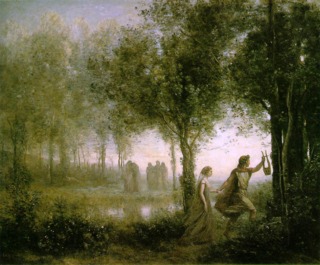Overview
Orpheus is a figure in Greek mythology, the son of the Thracian king Oeagrus and the muse Calliope (some versions of the legend cast Orpheus' father as the god Apollo). Apollo, fond of the young boy, gave him a small golden lyre, which Orpheus quickly mastered. Taught poetry and verse by his mother, Orpheus was so skilled at singing and making music that he was called "Master of Strings" and "Father of Songs".
 An oil painting of Orpheus and Eurydice by Jean-Baptiste-Camille Corot. Don't look back, idiot!
An oil painting of Orpheus and Eurydice by Jean-Baptiste-Camille Corot. Don't look back, idiot!Upon the death of his wife Eurydice, Orpheus was so distraught that his mournful singing brought even nymphs and gods to tears. Traveling to the underworld, he used his music to soften the hearts of Hades and Persephone, who allowed him to bring his wife back to the upper world, on the condition that he walk in front and not look back until they had both arrived on the surface. In his anxiety, Orpheus looked back, and saw his wife vanish, this time forever.
After Eurydice's second death, Orpheus became an apostate, refusing to worship the gods, save for Apollo, whom he thanked for his golden lyre. He also rejected the love of women, even that of the Thracian Maenads, followers of the god Dionysus. Angered by his spurning, the Maenads threw sticks and rocks at him as he played, but his music was so beautiful that even the inanimate objects refused to strike him. Enraged, the Maenads tore Orpheus to pieces. His head floated down the Hebrus river, continuing to sing sad songs until it was found and buried on the island of Lesbos. His lyre was carried to the sky by the muses and placed among the stars.
In Persona 3
Orpheus first appears in the game when the main character uses an Evoker device to trigger his awakening, announcing himself with the line "Thou art I...and I am thou...from the sea of thy soul, I come forth...I am Orpheus...Master of Strings...". In the same scene, Orpheus briefly transforms into Thanatos, another persona.
Orpheus' visual design is that of an android-like creature, with a mechanical body and a human head, whose face and hairstyle resemble that of the protagonist. Orpheus has a blue-white torso with a speaker in its center, a black face, white limbs, and wears a red scarf to cover his neck and bears a lyre. Some interpretations of the design suggest that it reflects Orpheus' legend, where after his death, only the head and lyre were left untouched, hence the completely mechanical body, yet human head and face. Orpheus uses his lyre as a melee weapon and strums it to cast magic.
Gameplay and Trivia
Orpheus belongs to The Fool arcana, the same arcana as that of the main character, and of the personae Decarabia, Slime, Legion, Susa-no-O, Black Frost, and Loki.
Orpheus initially bears the innate skill Agi (fire), and gains the skills Bash and Tarunda at levels 2 and 5. Orpheus prefers to inherit fire-based skills when fused. The fusion of Orpheus with the persona Apsaras of the Priestess arcana typically inherits the skill Cadenza.
With the FES expansion (or the FES rerelease in north America), players could unlock a special version of Orpheus, known as Orpheus Telos (Japanese: Orpheus Kai), also of the Fool arcana. Orpheus Kai/Telos has the same design as the original Orpheus, except bearing a different color scheme. Orpheus Telos sports a red torso, pure white hair, face and eyes, and a light grey scarf. Interpretations of the design suggest that its changed white face and hair reflects the appearance of another key persona, Messiah, the ultimate incarnation of the Judgment arcana.
Orpheus Telos can only be obtained by maxing out all the possible Social Link relationships within one playthrough. Achieving this without the use of the New Game feature can be very difficult, requiring a delicate balance of attribute, relationship, and time management, while continuing to gain sufficient experience to climb Tartarus tower. Maxing out all the social links cues a special event in which Igor presents the protagonist with the Colorless Mask, a special item which enables the summoning of Orpheus Telos.
Orpheus Telos is unique in that it begins with no skills whatsoever (except the skill Victory Cry, obtainable with a level 97 fusion), and can inherit any possible skill. Carefully coordinated fusion and leveling of Orpheus Telos' component persona can result in an Orpheus Telos bearing many very powerful skills, ones sufficient even to defeat the immensely dangerous optional boss.
Orpheus Telos is described in the persona compendium with the line "By bonding with many people, Orpheus was once again born from the sea of the soul. He has awakened to the power of Cipher, which holds endless possibilities."
The word "Telos" is a Greek philosophical term for "end", "purpose" or "goal". This can be interpreted as Orpheus Telos representing the ultimate achievement, the one persona for whom there are infinite possibilities [of skill combinations], and is a reflection of the Fool arcana and the player himself.
Persona 3 Portable
In Shin Megami Tensei: Persona 3 Portable, the new playable female main character also features Orpheus as her starting Persona. However, her version of Orpheus is female.
Links to Other Shin Megami Tensei Games
In Shin Megami Tensei: Persona 4, the starting persona of the unnamed main character is Izanagi, a deity from Japanese mythology. Izanagi's role in Japanese legend is strikingly similar to that of Orpheus for the Greeks; Izanagi travels to the underworld, Yomi, to revive his deceased spouse, but ultimately fails. The similarity between the stories of Orpheus and Izanagi was almost certainly an attempt to forge a thematic link between the two starting personas, and by extension, the two main characters of Persona 3 and 4.
Log in to comment